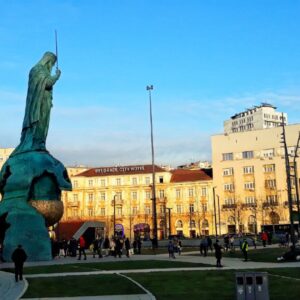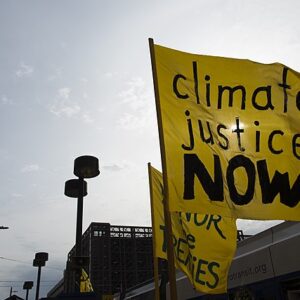Monuments Matter
A Comment on Bristol
By Marie-Louise Jansen • 8 June 2020
Yesterday, protestors in the English port city of Bristol toppled a statue of an 18th Century slave- trader, dragged the life-size bronze through the streets, and heaved it over a stone embankment into the Bristol harbour. Hundreds of Bristol residents looked on and cheered. (See appended link). The statue’s unauthorized removal and disposal appeared to resolve a decades-long debate over Edward Colston, a slave trader and local benefactor, whose name and image are honored throughout the city, including by a statue on central square. “Well that put an end to the debate (unless someone tries to put it back up),” someone observed on Twitter Sunday afternoon. “Slave trader Edward Colston statue taken down in #Bristol #BlackLivesMattters”.
The Colston statue “removal” is the most dramatic turn in a series of incidents that have found statues at the center of mass protests over the killing of a black man, George Floyd, by police in Minnesota. Last Saturday, protesters placed a noose around the neck of a statue of a Confederate general and toppled it from its plinth in a park in Richmond, Virginia. A few days earlier, a statue of Philadelphia’s former mayor and police chief, Frank Rizzo, an avowed racist, was removed by the city when the statue became the focus of mass protests, as reported on this blog.
As one of Bristol’s leading slave traders and most generous benefactors, Edward Colston is omnipresent in this southwestern port city. Statues, schools, parks, streets and even pastries bear his name. The main cathedral has a large stained-glass window commemorating Colston, and each year November 13 is celebrated as “Colston Day.” At Colston’s Girls’ School, the pupils wear “Colston’s flower” (chrysanthemum), and during the school ceremony read passages of his will while hearing a sermon on the good Samaritan. They were never told about the 85,000 people enslaved on Royal African Company ships while he was involved with the company.
Bristol’s confrontation with the Edward Colston legacy dates to 1921 when a biography written by Rev Wilkes questioned Bristol’s “cult of Colston”, detailing Colston’s involvement in slavery. It took another 70 years for the controversy to come to broader public attention. In 1998 an activist scrawled the words ‘Slave Trader’ on the statue’s base, and the protest movement became more vocal. In 2015, a new civil society campaign, Countering Colston, was formed, carrying out historical research, cataloguing the various Colston memorializations in the city and publicizing findings in the local press. Countering Colston also lobbied to have the name erased from Colston Hall, the city’s primary music venue, and Colston Primary School.
In 2007 when Nelson Mandela was invited to Bristol to commemorate the bicentennial of the act abolishing the slave trade in Bristol, local activists wrote to the South African president cautioning him that “Bristol is not quite the liberal, multi-racial place it pretends to be”. Mandela declined the invitation. That same year, the BBC reported that the popular Bristol rock band, Massive Attack refused to perform at Colston Hall, where stars like The Beatles, David Bowie, Bob Dylan and others have performed.
Marti Burgess, a Countering Colston activist, and a former trustee of Colston Hall, was instrumental in persuading the board to change the name of the Hall. In April 2017, the trustees voted to rename the venue as part of the refurbishment for its 150th anniversary in 2020. Two petitions circulated opposing the renaming, each gathering circa 5000 names. Dr Joanna Burch-Brown from the University of Bristol, an active member of Countering Colston, analyzed the social media responses, as well as the hundreds of letters submitted to the local press. “Letter-writers argued that removing Colston’s name from Colston Hall amounted to erasing history,” Burch-Brown wrote, summarizing a wide range of arguments, “sanitizing the past, destroying heritage, doing injustice to a great Bristolian, pandering to a politically correct minority, removing decisions about Bristolian heritage from Bristolian hands, ignoring the fact that white people too have been exploited and enslaved, indulging a ‘snowflake’ victim mentality, ignoring more important contemporary issues like ‘modern day slavery’ and FGM, and unfairly blaming British people for slavery when it was Africans who enslaved fellow Africans in the first place.” Burch-Brown cites letter-writers who called the renaming Colston Hall ‘a fascist, Stalinesque and Orwellian rewriting of history.’” 1
The movement was also successful in bringing name change to Colston’s Primary School, which, over a three-month period, held an awareness-raising campaign with the school community, after which they voted to rename the school. Unlike the response to the renaming of Colston Hall, the press reported little negative reaction, due perhaps to the consultative process undertaken by the school administrators. In spring 2018, the new lord mayor of Bristol, Cleo Lake, an activist with Countering Colston, ordered Colston’s portrait removed from her office. “I won’t be comfortable sharing it with the portrait of Colston,” Lake told the press. “As part of my role in campaigning with the Countering Colston team, I also think it’s fitting that I don’t share this office with the portrait.”
Deliberations were also underway for the disposition of the Colston statue until last Sunday when Bristol residents took matters into the their own hands. The city must now decide whether to leave Colston at the bottom of the river, fish the statue out and find it a new home, or “put it back up,” as the Sunday tweet observed, and let the debate go on.
[1] Joanna Burch-Brown, “Is it Wrong to Topple Statues& Rename Schools? Journal of Political Theory and Philosophy, 2017 Vol 1: 72-73.
Originally published via EuroClio News on 8 June 2020.
Interested in further exploring the topic of contested monuments? EuroClio has published a source collection that offers various examples from across Europe of controversial monuments and of monuments that represent/commemorate controversial history.




